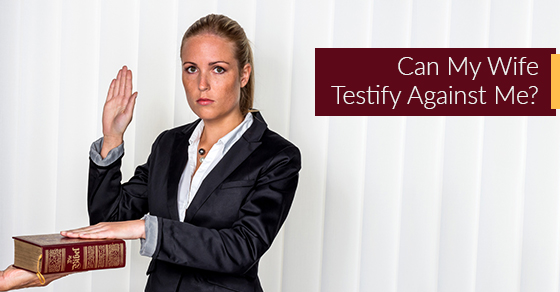Can My Wife Testify Against Me?

If a man confesses to his wife that he murdered someone, it used to be the case that the spouse could not testify against her husband in court, even if she wanted to. Under the spousal incompetence rule, spouses were barred from testifying for the prosecution against their husband or wife. Only a few exceptions to this rule existed: for example, if the accused was charged with offences that involved a threat to the spouse’s health, life or liberty, or where a child under the age of 14 was put in danger.
With the recent enactment of the Victims Bill of Rights Act (Bill C-32) on April 23, 2015, spouses can now be forced to testify. This amendment is codified under section 4(2) the Canada Evidence Act, which asserts that spouses are both competent and compellable witnesses. Competence refers to an individual’s legal capacity to give evidence in court. If the witness is unable to communicate the evidence to the court, s/he is deemed incompetent and is not permitted to testify, even if s/he wishes to do so. On the other hand, to be compellable means that a person can be forced to provide evidence through a subpoena and will be held in contempt of court if s/he fails to obey.
The abolishment of the historical spousal incompetency rule is rooted in concerns over the loss of potentially relevant and reliable testimony. For example, in the case of R v Couture, a videotaped statement, where a woman told police that her husband had confessed to killing two people, was excluded as evidence because she could not be called upon to testify about the truth of its contents under the old rule. The policy rationale behind the maintenance of spousal incompetency rule was the belief that compelling a spouse to testify was morally wrong and had the potential to disrupt marital harmony. Furthermore, because spouses likely have an interest in the outcome of the case, it was argued that courts ran the risk of receiving falsified testimony.
This rule served as an obstacle to presenting important evidence in court. In addition, there was a lack of convincing proof showing that admitting such evidence would result in marital discord. These factors, combined with changing social norms about marriage, caused an overhaul of the spousal incompetency rule. But it was only a partial overhaul: some of the most old-fashioned reasoning behind the rule remains in place.
A spouse can now be subpoenaed to testify in court against their husband or wife, but s/he is not obligated to disclose any communications with their spouse during the course of their marriage. This protection is known as marital privilege and still remains in the Canada Evidence Act under section 4(3). Only the recipient of the communication is able to exercise marital privilege, not the person who initiated the communication. Therefore, the accused cannot invoke marital privilege to prevent his wife from revealing information divulged to her. The recipient of the confidential information has full discretion to assert or waive the marital privilege. When placed on the stand, the spouse has the right to refuse to answer certain questions and withhold evidence.
The use of marital privilege is limited in important ways. For instance, it does not apply to communications that occurred before or after the marriage. So an accused cannot silence his girlfriend by marrying her. In addition, spouses must remain married and together when the witness testifies. A wife who is divorced or separated from her husband can still be forced to testify against him in court. The purpose of marital privilege and the spousal incompetency rule was to support marital harmony. Hence, because there is no actual “marriage” to preserve in a common law relationship, common law spouses do not enjoy the protection of marital privilege. This benefit only applies to communications between legally married couples during their marriage. Although the limited scope of marital privilege is discriminatory towards common law spouses, the Supreme Court of Canada in the case of R v Nguyen concluded that this discrimination is justified under section 1 of the Canadian Charter of Rights and Freedoms.
Modifying the outdated spousal incompetence rule has aligned the rules regarding the compellability of spouses with the general laws of evidence which seek to uphold the truth-seeking function of the justice system. The spousal incompetence rule served as a manifestation of traditional duties that wives had towards their husbands – namely obedience and servitude. In the past, a husband and wife were considered in law a single person, and in turn their interests were deemed identical. However, with the recognition of female autonomy these justifications have become obsolete. Nonetheless, spousal privilege still serves to block the inclusion of potentially relevant and reliable evidence in court.
As the law stands today, society’s interest in promoting marital harmony trumps the pursuit of truth in criminal trials. In Canada, we have therefore mostly preserved a fossil of a rule, based on outdated concepts of the role of men and women. This rule stays on the books, along with other quaint sections such as theft from oyster beds, or alarming Her Majesty.

